Financial Accounting Principles Assignment
Added on 2020-10-05
27 Pages4402 Words498 Views
Financial AccountingPrinciples
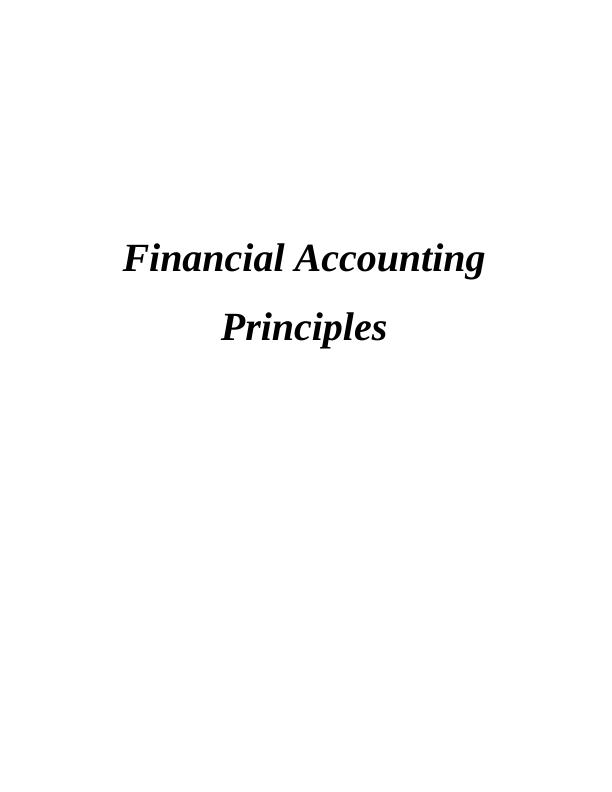
Table of ContentsTable of Contents.............................................................................................................................2INTRODUCTION...........................................................................................................................3BUSINESS REPORT......................................................................................................................3(a): Concept of financial accounting and their purpose..........................................................3(b): Regulations associated with financial accounting...........................................................4(c): Accounting rules and principles.......................................................................................5(d): Convention and concepts associated with consistency and material disclosure..............7CLIENT 1........................................................................................................................................7CLIENT 2......................................................................................................................................18CLIENT 3......................................................................................................................................20CLIENT 4......................................................................................................................................22CLIENT 5......................................................................................................................................24CLIENT 6......................................................................................................................................25CONCLUSION..............................................................................................................................26REFERENCES..............................................................................................................................28
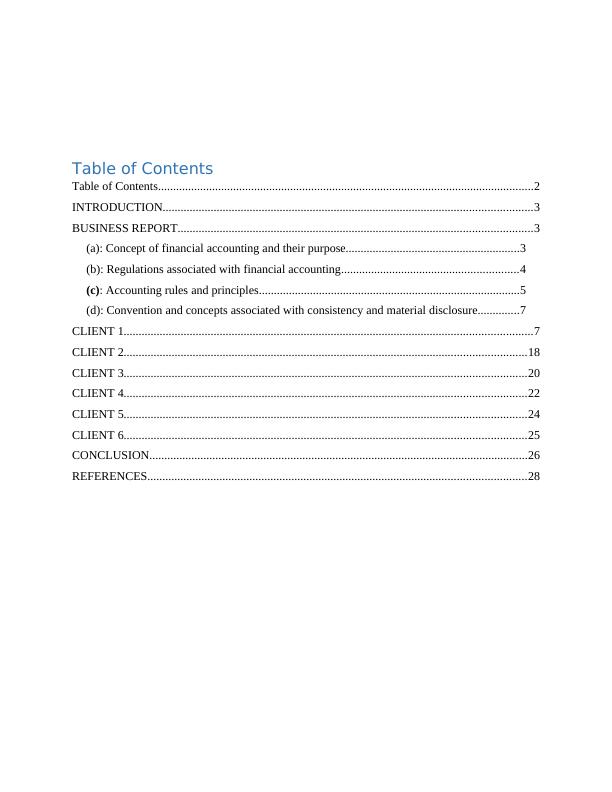
INTRODUCTIONFinance is a wider term that provide information about two associated activities such asthe study of managing money and actual process of acquiring required capital. It has beenanalysed that individual or government both need funds to operate their business. It is aneconomic activity that would assist commercial entities to generate maximum profitability for anorganisation for short period of time. Financial accounting can refer as management ofrecording, summarising and evaluating various transactions that are incurred by the companyduring an accounting period of time. This project is all about providing specific informationabout regulations those are associated with the accountancy. Apart from this, rules, principlesand conventions related with the accounting which is being discussed under this report. Further,this project consists of prime entry and ledger accounts. Preparation of profit and loss statementof LMS Ltd is also being given below. Concepts of bank reconciliation statement and associatedrecording of transaction by Kendal Ltd is mentioned under this report effectively (Edwards,2013).BUSINESS REPORT(a): Concept of financial accounting and their purposeFinance is said to be one of the specific art and ability to managing overall funds that aregenerated by the company within an accounting period of time. It consists of financial servicesand instruments. It consists of capital, funds and money that are generated within anorganisation. Financial accounting is one of the reliable aspects of recording, classifying andevaluating overall management of various transaction as well as capital that are invested indifferent projects of the company. On the other hand, it is also associated with preparation ofvarious statements or reports such as incomes statements and balance sheet of an organisation.The role of financial manager is to make proper availability of essential aspects that are usefulfor the company to organise their entire business operations in well manner (Zeff, 2016). Thereare various types of information that are associated with finance and non-finance on continuousbasis. That would lead to make use of automatic system to record each entries. There are varioustypes of accounting statements which are prepared by the finance officers. Some of them arementioned underneath: 3
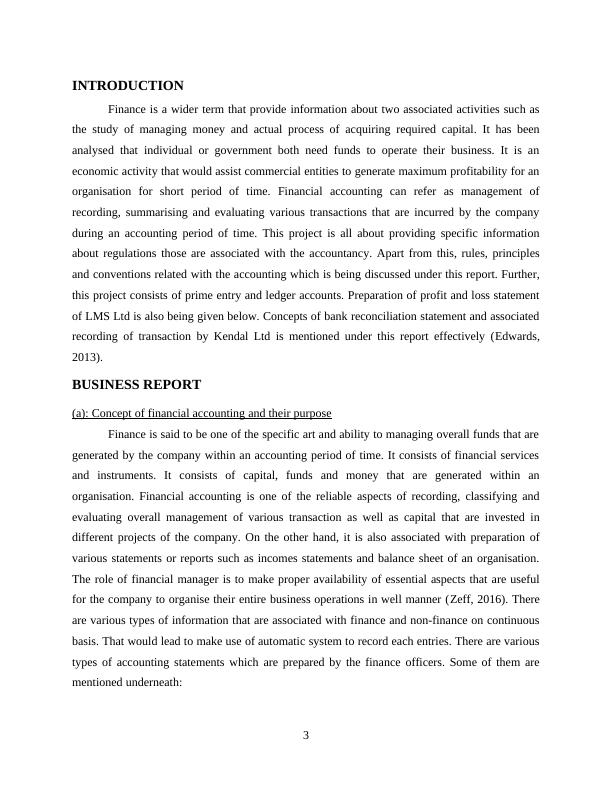
Profit and loss statement: It is one of the main report that will be prepared to recordevery income earn by the company and total expenses given to get that particular profits.Managers are responsible for analysing net profit and loss generated during the period of time. Purpose: The primary objective of preparing income statement is done to analyse total earning acompany is generating from the entire sale of product and services.It would be further evaluated for the purpose of attaining certain loan from financialinstitution to organise their projects (Alver, Alver and Talpas, 2013). Balance sheet: It is said to be effective financial statement that displays company’s total assetsand liabilities of the company. It has been found that a standard format followed within anorganisation consists of two sides. Purpose: To examine necessary changes in an individual goods recorded into the balance sheet sothat upcoming decision can be made effectively. To determine owner funds as well as indicate certain chance of growth in coming periodof time.Cash flow statement: It is known as one of the reliable statement that can provide overallanalysis about the total cash inflow and outflow incurred by the company within an accountingperiod. It can be collected from various activities such as operating, financing and investing. Purpose: The primary purpose of this statement is to deliver information regarding cash receipts,payments and net changes in cash outcomes from various activities.To deliver statements to the investors in order to analyse position of cash they are havingto plan their upcoming projects. (b): Regulations associated with financial accountingIn every business organisation, accountant used to follow necessary rules and regulationthat are made by the concern agencies of board to record each and every transaction in correctmanner. This will provide certain base to remain away from any kind of mistakes that aregenerally occurs while recording (Fourie and et. al., 2015). For the purpose of managing andcontrolling the financial results at large scale is little tough task. It should not be simple toevaluate the results, whether transactions are posted accurately in their concern format. In4
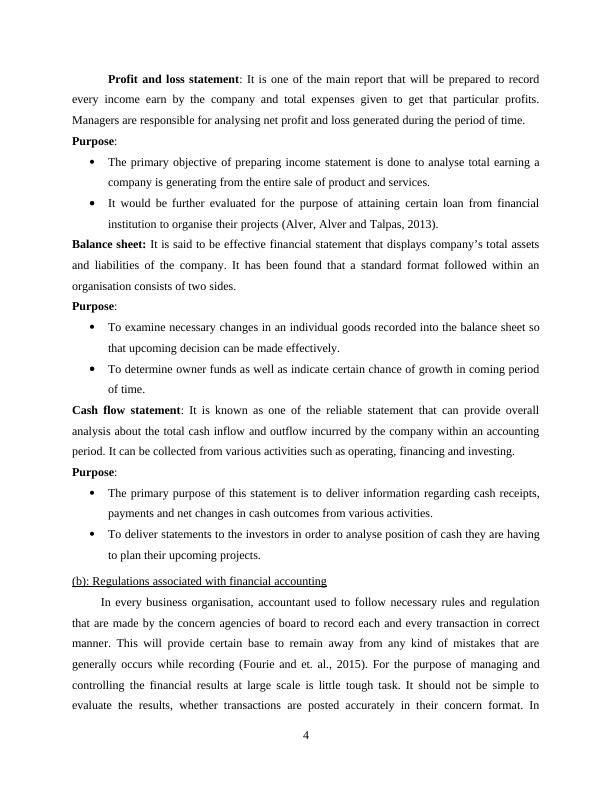
accordance to face with such kind of problems, most of the company are following essentialrules and standards. Moreover, the idea is just to become more valuable to take into accountevery decision at major superiority. IASB (International accounting standard board): It is known as international bodythat is made for the purpose of controlling and management for recording of necessary records.These are formed in order to regulate essential rules in respect to get accurate results in comingperiod of time. They use to provide necessary rules and standards in order to record data inproper manner. IFRS (International financial reporting standard): It is effective set of accountingstandard that is made by an independent body called as IASB. It is associated with qualitymanagement of bookkeeping so that every transaction is being recorded in proper manner. Thereare various regulations that can be needed to be followed within an organisation. Some of themare:IFRS 1 (First-time approval of the standards of international financial reporting): Itused to permit early application of new IFRS that is not yet essential but allows earlyapplication.This is the starting point for their accounting in respect with IFRSs.IFRS 2 (Shared Based Payment): It is made to specify the financial reporting an entitywhen it undertakes a shared based payment (Mullinova, 2016).There are many other regulation standards that are requisite to consider while developingthe file. An organisation need to carry out operations on the grounds of those criteria orregulation to work ethically. (c): Accounting rules and principlesThere are different types of accounting norms and principles are available through whichan organise can record effective transaction in reliable manner. Some rules are mentioned below:Accounting rules: It is said to be systematic rules and strategies which will be used toanalyse different accounting transactions. Some of them are given underneath: Personal account: This is one of the effective rules that are associated with anindividual, organisation or a company. it is more simple to analyse every transaction thatare having the capability to deal with every kind of issues. Example, Debtors, creditorsand consideration for products suppliers.5
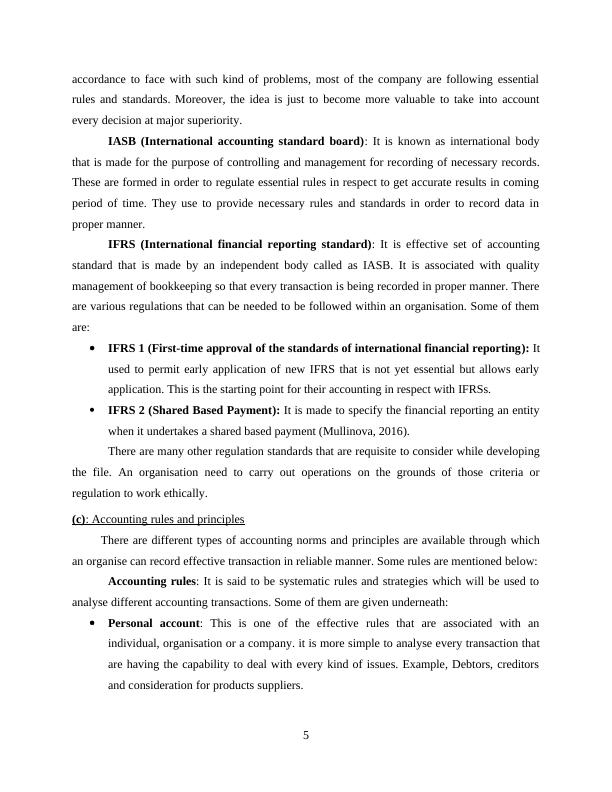
Real account: The financial accountant of an organisation is needed to categories everyitems as per their impacts of nature. The rules say that “debits what comes in” and “creditwhat goes out”. Example, fixed assets and cash. Nominal account: Under this rules, accountant need to debits all expenditure & lossesand credit all income and earnings. Like for examples, Purchase, sales and commissionearned (Agasisti and Catalano, 2013). Accounting principles: Materiality: This seems to be one of the effective accounting principles that financemanager must be liable to record only material facts or transaction into various statements of thecompany. Revenue recognition: Basically, earning is recognised in only those situations when anycritical event occurs and the amount of earning can be measurable. It is associated withaccounting period under which earning and expenses would easily be analysed effectively. Conservation: According to this principles, an accountant will use to do in advance ordisclose losses, but it cannot allow same actions for coming future profits. This policy tends todetermine rather than overemphasize net effects and net earnings. Matching principle: Under this, the data recorded by the accountant must be use foraccrual basis. It is generally associated with the certain aspects that all expenses must be matchedwith earning those are generated within the period (Barth, 2015).Going concern: As, it has been seen that business is continuous process that it isoperated for long time. There accountant believes that companies should not be able tocommence the account until all the statements are not disclosed.Full disclosure principles: It is crucial for the external or internal parties to makeevaluation of various financial statement. The role of manager to disclose all essential reports infront of investors so that they can make necessary decision. Cost principles: As per the accounting principles that every financial and non-financialinformation can be recorded only n cash basis.Time period assumption: This seems to be effective accounting concepts that a businesswould report that financial outcome of their activities over a usual time period. It is usuallyprepared on monthly, quarterly and yearly basis (Tschopp and Nastanski, 2014). 6
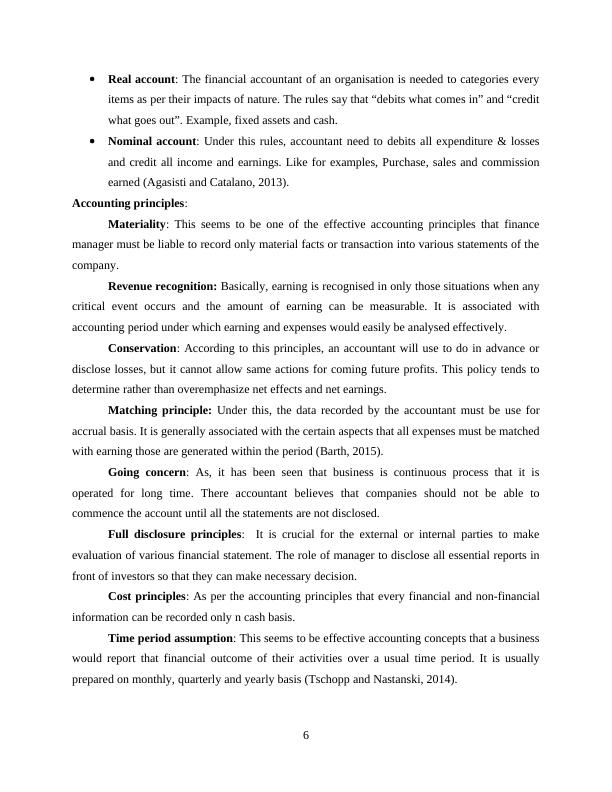
End of preview
Want to access all the pages? Upload your documents or become a member.
Related Documents
Financial Accounting Principles : Doclg...
|20
|4019
|483
(Doc) Financial Accounting Assignment Solutionlg...
|19
|4006
|394
FINANCIAL ACCOUNTINGlg...
|23
|7737
|49
[PDF] Financial Accounting Principles Assignmentlg...
|28
|5816
|461
TABLE OF CONTENTS Introductionlg...
|28
|4256
|429
Financial accounting table of contentslg...
|28
|5876
|90
